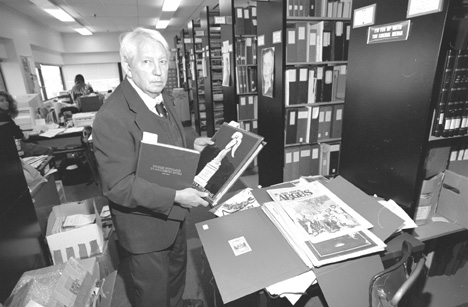The University Record, April 1, 1998
By Janis Giannini and Peggy Daub
University Library
|
|
|
Ed Weber has cared for the Labadie Collection, the University’s archive of social protest literature, since 1964. He is noted for his experience as a reference librarian and his encyclopedic general knowledge. Photo by Bob Kalmbach |
“Money brought me here,” says Ed Weber, who has been with the University Library for 45 years. And that 1952 offer of a salaried fellowship at $2,250 probably saved the librarian from the electric chair. That’s where his first-grade teacher, Sister Hermanda, told his parents the youngster would end up.
A born rebel, Weber’s unorthodox views and outspoken nature resulted in his expulsion from grades 1, 2 and 6. “I always had more to say than the teacher,” the voracious reader says.
Weber found his niche at the U-M with the renowned Labadie Collection of social protest literature, where he has served since 1964. A magna cum laude graduate of the University of Rochester with a master’s degree in American literature from Columbia University, Weber is noted for his expertise as a reference librarian, where his patience and skill are a good match with his encyclopedic general knowledge. He also is known for his specialized knowledge in Labadie subject areas and his expertise in collection development. His persistence and originality in obtaining ephemeral and obscure publications have reaped many acquisitions that have strengthened the Labadie Collection.
“I arrived in Ann Arbor on a Sunday in September on my 30th birthday,” Weber remembers. “People were so friendly here and I loved it. I took classes half-time (working toward a master’s degree in library science) and worked 32 hours a week in the library.”
Those were the days when the library had a bridge club that met once a month, and also hosted a record club. Coffee and donuts were available every day for a small fee in the staff lounge. At that time, the Labadie Collection was housed behind chicken wire on the eighth floor of the old building. “We’d give users a key to the chicken wire enclosure and send them up there on their own,” Weber recalls. “The collection was a mess. When I took it over, they gave me an assistant and we worked hard on cleaning it up and organizing everything. I loved building up the collection and doing the reference work, but I hated administration.”
“Ed has taught me a lot about many things–music, dance, theater, gardening and social protest,” says friend Jerry Thornton. “He even tried to get me to like poetry, with no success! We marched together in the early ’60s to protest racial discrimination in Pittsfield Village. We’ve traveled together over the years to New York, Albany and Saratoga Springs, New York, for ballet, to Chicago for opera and to Stratford and Niagara-on-the-Lake in Ontario for theater.”
If age and his years at U-M have tempered Weber, you wouldn’t know it. He remains outspoken and as subversive as ever–the perfect curator for the renowned Labadie Collection. A conversation with Ed is an illuminating journey through the complex, turbulent social protests and movements of American history.


